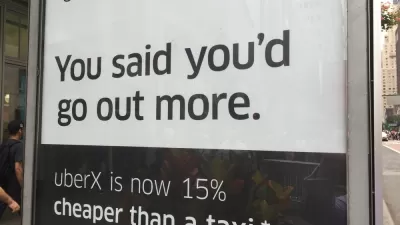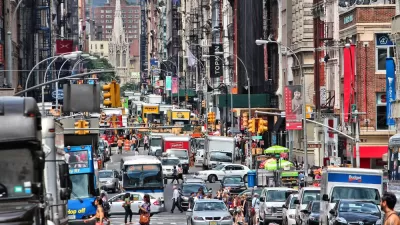These aren't the ride-hailing outcomes we were promised.

A new working paper by researchers at the Stigler Center at the University of Chicago Booth School of Business finds evidence that the dawn of transportation network companies coincides with increases in vehicle registrations and traffic fatalities—outcomes far from the utopian ideal predicted by proponents of TNCs when they first hit the streets.
Luigi Zingaled shares the findings of the new Stigler working paper by John Barrios (University of Chicago), Yael Hochberg and Livia Yi (Rice University):
Not only does the introduction of ride-sharing seem to not reduce congestion, it actually increases the number of car registrations by 3 percent. Most importantly, Barrios et al. find that the introduction of ride-sharing increases the number of fatal accidents by 3 percent (in the aggregate, this is equivalent to 987 extra lives lost every year in the United States alone).
The researchers built these finds on evidence found in data on traffic fatalities from the National Highway Traffic Safety Administration (NHTSA).
Exploiting the staggered entry of ride-sharing into different cities, the authors were able to measure the changes in accident trends in the eight quarters that preceded and followed the introduction of ride-sharing. As the figure [in the article[] shows, there is a rise in fatal accidents following the entry of ride-sharing into a city (time zero)….
The article concludes by suggesting the policy mechanism that will most effectively address the externalities generated by TNCs (hint: it's not a ban or cap on the number ride-hailing drivers).
The new paper is the latest of a string of new data and research to emerge on the impacts of transportation network companies like Uber and Lyft. The news has mostly been bad, with perhaps one exception. Seattle and the Bay Area have quantified how much traffic ride-hailing adds to transportation system, and multiple studies suggest ride-hailing poaches rides from public transit.
FULL STORY: Does Uber Kill? The Real Cost of Ride-sharing

Alabama: Trump Terminates Settlements for Black Communities Harmed By Raw Sewage
Trump deemed the landmark civil rights agreement “illegal DEI and environmental justice policy.”

Planetizen Federal Action Tracker
A weekly monitor of how Trump’s orders and actions are impacting planners and planning in America.

The 120 Year Old Tiny Home Villages That Sheltered San Francisco’s Earthquake Refugees
More than a century ago, San Francisco mobilized to house thousands of residents displaced by the 1906 earthquake. Could their strategy offer a model for the present?

In Both Crashes and Crime, Public Transportation is Far Safer than Driving
Contrary to popular assumptions, public transportation has far lower crash and crime rates than automobile travel. For safer communities, improve and encourage transit travel.

Report: Zoning Reforms Should Complement Nashville’s Ambitious Transit Plan
Without reform, restrictive zoning codes will limit the impact of the city’s planned transit expansion and could exclude some of the residents who depend on transit the most.

Judge Orders Release of Frozen IRA, IIJA Funding
The decision is a victory for environmental groups who charged that freezing funds for critical infrastructure and disaster response programs caused “real and irreparable harm” to communities.
Urban Design for Planners 1: Software Tools
This six-course series explores essential urban design concepts using open source software and equips planners with the tools they need to participate fully in the urban design process.
Planning for Universal Design
Learn the tools for implementing Universal Design in planning regulations.
Clanton & Associates, Inc.
Jessamine County Fiscal Court
Institute for Housing and Urban Development Studies (IHS)
City of Grandview
Harvard GSD Executive Education
Toledo-Lucas County Plan Commissions
Salt Lake City
NYU Wagner Graduate School of Public Service





























